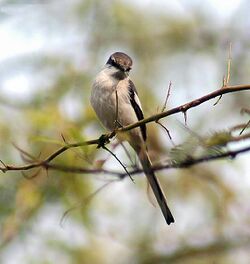Biology:White-bellied minivet
| White-bellied minivet | |
|---|---|

| |
| at Bharatpur, Rajasthan, India . | |
| Scientific classification | |
| Domain: | Eukaryota |
| Kingdom: | Animalia |
| Phylum: | Chordata |
| Class: | Aves |
| Order: | Passeriformes |
| Family: | Campephagidae |
| Genus: | Pericrocotus |
| Species: | P. erythropygius
|
| Binomial name | |
| Pericrocotus erythropygius (Jerdon, 1840)
| |
| Synonyms | |
| |
The white-bellied minivet (Pericrocotus erythropygius) is a species of minivet found in India , mostly in dry deciduous forest.
Etymology
The origin of the vernacular name of minivets is not known but it seems to be the English adaptation of an Indian name perhaps imitative. The genus Pericrocotus seems to be related to the saffron color of some minivets.
Description
The male white-bellied minivet has a shiny black head, neck, tail and mantle. The species has a white collar, the throat is orange, the rest of the underparts are also white. The rump is orange with white markings on the wings.
The female minivet is duller in appearance, with dark gray upperparts, black wings, white collar, black tail and shiny black lores. The wings have white markings similar to those of the males, and the rump is orange.[2]
It measures between 18.5 and 20 cm long.
Habitat and behavior
The white-bellied minivet is native to Nepal and India , mainly in dry deciduous forests. This species inhabits open savanna with sparse acacia shoots, dry grasslands and artificial terrestrial areas such as agricultural land. It occupies an extremely large area of occurrence of over 20,000 km2.[3] [4]
The minivet usually moves in small groups, sometimes joining other species. It feeds mainly on insects that it catches in flight or by perching in the canopy of trees.[5]
Its voice is a pleasant whistle.[6]
Reproduction
This bird makes its nest high in the tree tops. The nest is a cup-shaped structure woven with small twigs and spider webs to increase the strength of the nest. Usually four eggs are laid. These are incubated for 17 to 18 days. Incubation is mainly done by the female, but both birds help raise the offspring.
Subspecies
There are two subspecies of the white-bellied minivet : [7]
P. e. albifrons: present in the plains in central Myanmar;
P. e. erythropygius : present in peninsular India (Punjab and Rajasthan to Bihar and Mysore).
Conservation status
The population is stable, it is considered by the IUCN as "least concern".[8]
Gallery
References
- ↑ BirdLife International 2017. Pericrocotus erythropygius (amended version of 2016 assessment). The IUCN Red List of Threatened Species 2017: e.T103694110A112745733. https://doi.org/10.2305/IUCN.UK.2017-1.RLTS.T103694110A112745733.en. Downloaded on 19 August 2019.
- ↑ "Pericrocotus erythropygius". https://ebird.org/species/whbmin3?siteLanguage=fr.
- ↑ "Minivet à ventre blanc". https://www.aerien.ch/oiseaux/Pericrocotus_erythropygius.php.
- ↑ "White-bellied Minivet Pericrocotus erythropygius". http://datazone.birdlife.org/species/factsheet/white-bellied-minivet-pericrocotus-erythropygius.
- ↑ "Minivet à ventre blanc". https://ebird.org/species/whbmin3?siteLanguage=fr.
- ↑ "Pericrocotus erythropygius". https://www.xeno-canto.org/species/Pericrocotus-erythropygius.
- ↑ "Minivet à ventre blanc". https://www.aerien.ch/oiseaux/Pericrocotus_erythropygius.php.
- ↑ "White-bellied Minivet". https://www.iucnredlist.org/species/103694110/112745733.
Wikidata ☰ Q1081105 entry
 |




